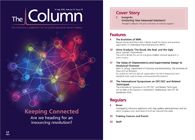Waters Collaborates with BTI on Glycosphingolipid Project
Waters Corporation has announced a collaboration with the Bioprocessing Technology Institute (BTI), a research institute within Singapore’s Agency for Science, Technology, and Research.
Waters Corporation (Massachusetts, USA) has announced a collaboration with the Bioprocessing Technology Institute (BTI), a research institute within Singapore’s Agency for Science, Technology, and Research (A*STAR).
The joint effort will develop a glycosphingolipid (GSL) head group database containing Glucose Unit (GU) retention times1 and collision cross-section (CCS) values, forming an experimental library for diseaseârelated GSL glycans together with a glycan/MS spectral library.
GSLs constitute a glycan head group attached to fatty acyl moieties, and are critical for cell growth interaction, and signalling. Alterations to their structure can cause disease or promote cancer development, however, analysis of glycan head groups has proved difficult because their isomeric structures are not easily differentiated by either liquid chromatography (LC) or mass spectrometry (MS) when used alone.
“Collaborating with Waters will enable BTI to apply its expertise in glycomics to develop analytical methods and a library of information on GSLs that doesn’t yet exist today. This will allow us to probe for potential clinical markers and to provide insights into disease progression and regression following therapeutic intervention,” said Dr. Susanto Woen, Research Scientist, BTI.
A key aim of the project is new therapeutic strategies for the detection of cancer markers through a deeper understanding of glycosylation pathways but significant technological advancements are also expected.
“The partnership allows us to be part of an international glycomics research network pioneering technologies required to determine the potential association between GSL glycosylation and any phenotypic/genotypic traits in disease or disease states,” continued Woen.
As part of the collaboration, Waters will contribute scientific expertise and use of its analytical systems. For more information please visit www.waters.com
Reference
- S. Albrecht et al., Anal. Chem.88(9), 4795–4802 (2016) DOI:10.1021/acs.analchem.6b00259.

Regulatory Deadlines and Supply Chain Challenges Take Center Stage in Nitrosamine Discussion
April 10th 2025During an LCGC International peer exchange, Aloka Srinivasan, Mayank Bhanti, and Amber Burch discussed the regulatory deadlines and supply chain challenges that come with nitrosamine analysis.












